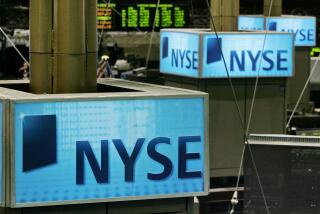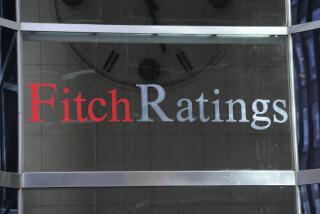Little Improvement Seen in Firms’ Debt Ratings
- Share via
U.S. companies’ credit quality is not expected to recover significantly in 2004, even though the pace of rating downgrades is slowing, rating firm Standard & Poor’s said Monday.
Heavy debt, growing pension and medical liabilities and high energy costs will keep overall corporate credit quality in a slump next year, despite a recent surge in economic growth, S&P; managing director John Bilardello said.
“We haven’t really seen much debt reduction in the last five years,” Bilardello said. “With interest rates as low as they are, companies are using the debt markets because it’s economical for them, and that could be troublesome.”
In a sign of how burdensome corporate debt remains, S&P; still is cutting three company ratings for every one it raises -- although that has improved from a 10-to-1 ratio at the start of the year.
Nearly one-third of all corporate bond issuers could see their ratings cut again because they have negative outlooks or are on review for downgrade, according to S&P.;
“Credit quality, especially in the manufacturing and industrial sectors, has not yet turned the corner,” S&P; executive vice president Vickie Tillman said.
“Although the pace of decline has certainly improved, we remain skeptical of sustained high growth in the economy, especially as credit fundamentals of companies are not materially improving.”
S&P;’s outlook on the manufacturing sector is “fairly negative” because many companies are struggling with excess plant capacity and high energy prices, said Bilardello.
Another leading credit rating firm, Moody’s Investors Service, also has forecast that corporate credit quality won’t turn around until 2005 because companies are struggling with a debt overhang from the 1990s and unused plant capacity.
By the end of this year, credit downgrades will have outnumbered upgrades for 23 quarters, the longest slump in credit quality on record, according to Moody’s.
Despite ongoing concerns about corporate credit among the ratings firms, investors have pushed corporate bond yields lower in recent months, a vote of confidence on companies’ ability to pay their debts.
Yields on non-investment-grade junk bonds have fallen particularly sharply.
The yield on an index of 100 junk bonds tracked by KDP Investment Advisors dipped to 7.50% on Monday from 7.52% on Friday, and now is the lowest in at least a decade.
More to Read
Inside the business of entertainment
The Wide Shot brings you news, analysis and insights on everything from streaming wars to production — and what it all means for the future.
You may occasionally receive promotional content from the Los Angeles Times.










